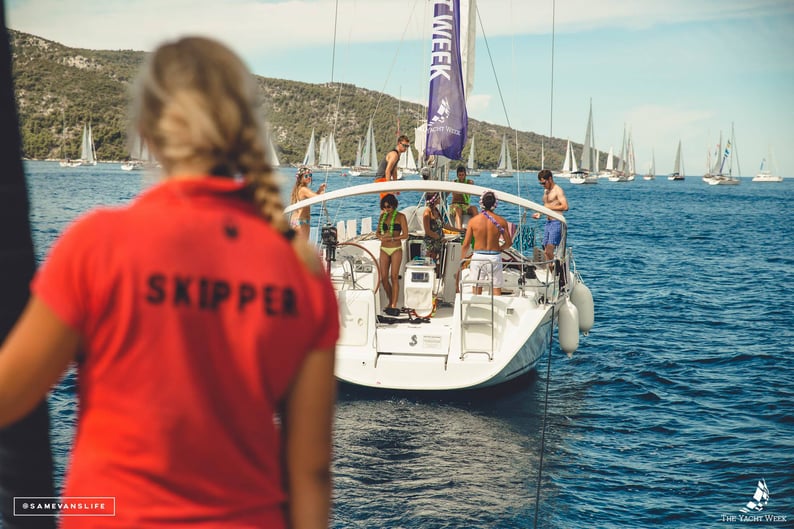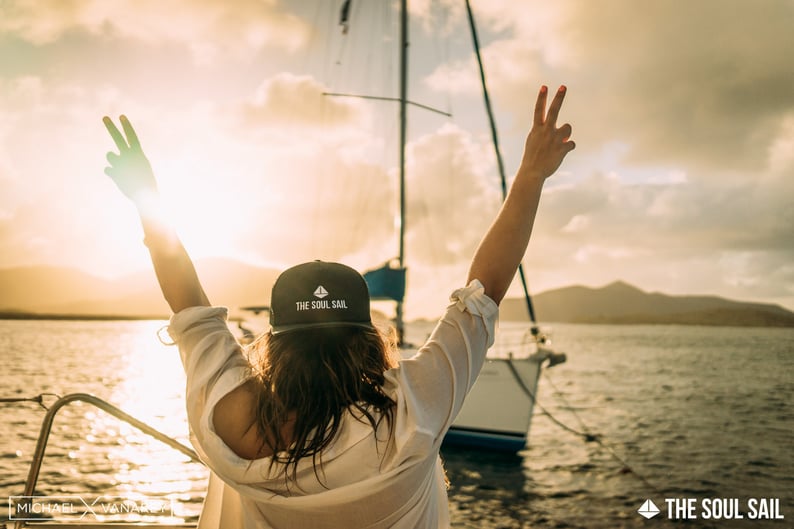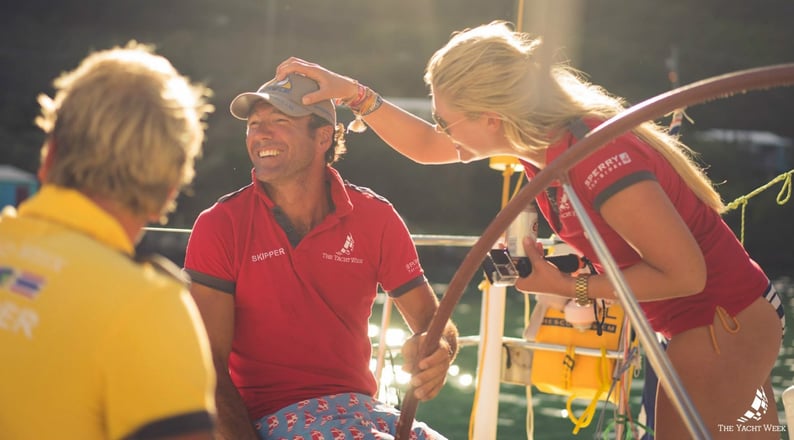Hostess to Skipper Learning Pathway
Glad to hear you're interested in becoming a skipper! As you may have seen in our recent Facebook post, this objective can be broken up into three steps which I will list again so each can be broken down. This was written primarily for hostesses working with The Yacht Week. If you are a hostess (this is an asexual term here, we just went with the term used most often) with another company a lot of this still applies; feel free to contact us.
The three steps to attaining your Yachtmaster:
1. Bareboat Skipper course
2. Sailing miles
3. Yachtmaster course

Thanks, Sam Evans and The Yacht Week for the image
Let's look at each in more detail:
Step 1: Bareboat Skipper Course
This is a seven day live-aboard course. It is pretty intense. It is best if you come with at least some experience. Having come from hostess-land you should have had enough experience at some of the basic but important skills like cleating a boat to a dock and provisioning - all valuable. Nevertheless we will encourage you to "empty your cup" so we can teach you the Sailing Virgins way (which is of course the right way). :) Click here for more information about the 101/103/104 Fasttrack Bareboat Skipper course.
You will need to purchase course materials from the ASA. There are three courses you will be examined on: the 101, 103 and 104, each with their own (very good) textbook. You might want to split the cost between two or more of you as all up these three books cost around $70. The 104 qualifies you to skipper your own charter boat. It is not a Yachtmaster. This comes later. The more familiar you are with the textbooks prior to your course, the more you will get out of your course, guaranteed.
Step 2: Sailing Miles
Coming out of the 104 you will have a log book and your Bareboat Skipper qualification. Now is the time to get some miles up. You need 600 miles for a Coastal Yachtmaster and 2,000 miles for an Offshore Yachtmaster. You are in a great position to get miles if you work with The Yacht Week in particular. Be careful counting every sailing mile as logged miles. You should only really count the miles where you are acting as skipper (or are at least actively involved in the sailing). Say for instance you actively get involved in the sailing for half the week. A typical Yachtweek might be 100 miles of sailing, so you'd count 50 miles on your log - a reasonable estimate (and, after a season, enough miles to sit your Coastal Yachtmaster). This is not a strict rule; rather it is a conversation that you will end up having with your Yachtmaster examiner when s/he quizzes you. We recommend being conservative in the counting of your miles. Here is a blog post we wrote earlier giving some ideas on building your sea miles.
If you get a chance to do a crossing at the end of the season you will have a great opportunity to get a bunch of miles and night hours in your logbook. A typical Transat will give you around 2,200 miles alone. If you're sailing on your average 35-50' yacht these are certainly "real" miles (for the difference between real and junk miles see the faq below).

Thanks Michael Vanarey and The Soul Sail for this image
Step 3: Yachtmaster Course
You have done your bareboat skipper and logged 600+ (or 2,000+) miles. Now is time to get your Yachtmaster. While you can do your ASA 106 (Yachtmaster) with Sailing Virgins I would actually encourage you to head to the Solent (ie. Southampton, UK) or South Africa to get your Yachtmaster. Why would I say this? Because the sailing there is different. It is much more tidal. You will receive different instruction. This is great as it becomes your decision which of the various methods you would like to make your own. The Solent in particular is an excellent place to learn. The English have a gravitas and respect towards sailing that perhaps no other culture has (which may have something to do with their being an island nation and relying on their navy on more than one occasion to save them).
After you have taken these steps you will be in a sound position to apply for the well regarded post-Yachtmaster Skipper Academy organised by Quarterdeck. Even if you have already completed this as a hostess, I would recommend your doing it again as a skipper (you can probably strike a discount with them; worth a try). However you may not actually want work as a skipper! You might be doing this for other reasons. To be more employable as a hostess is one (all other things being equal, if a charter company looking for a crew has a hostess or a hostess/yachtmaster, they will certainly choose someone who can back the skipper up if s/he gets sick/misbehaves). It's all good.

Thanks Hagop Kalaidjian and The Yacht Week for this image. And the gorgeous Klara Lönnemark, skipper.
Questions you may have:
Is the organisation (RYA or ASA or IYT) important for my bareboat skipper course?
It's not important, particularly at the bareboat skipper course. What is important is the instructor teaching you. A good instructor makes all the difference. All of the above associations have basically the same syllabus. All are well respected. When it comes to Yachtmaster you may wish to look at RYA as this is more universally accepted, particularly in Europe. We wrote this blog post earlier about these three organisations.
Is bareboat skipper the same as day skipper?
Yes. One is from ASA, the other is from RYA. They are the same level.
Will my Yachtmaster Examiner care about my Bareboat Skipper course?
Your Yachtmaster examiner won't care which association you chose for your bareboat skipper course. What they will look at is miles and experience. If you have been well taught and come with "real" as opposed to "junk" miles on your log, this is what counts.
What are "real" and "junk" miles?
Real miles are sailing with two friends during a storm somewhere and having to make decisions to bring yourself to safety. Real miles are taking your turn to be a skipper and making skipper decisions, having to bring a boat in, having to do your own passage plans, that sort of stuff. Junk miles are found by crossing the Atlantic as a deck hand on a 30m superyacht and calling that "your ocean crossing". It wasn't.
What about my work as a hostess? Do those miles count?
Alas working as a hostess on a boat does not qualify as miles unless you can really say you were involved in some way in the sailing. Once you have your 104 you will be in a great position to say to the skipper "I can take this leg if you like" etc., and actually swap roles for short periods. We all know some will be more amenable than others. I'd hazard to guess that 80% of Yachtweek skippers would be fine with this (actually most would be more than fine - most skippers love the thought of hostesses becoming skippers and would be happy to coach you).
Do I need any other qualifications?
If you haven't attained your STCW I would suggest you do so. You can do this off the back of your Yachtmaster course (try to align the two courses so they are in roughly the same place at roughly the same time). You can actually do this at any time but I'd suggest "lumping" the courses together is one approach that works.
You might also consider doing your sailing instructor ticket! If you have taken the steps described above and come with a few years of prior sailing experience you will be well placed to sit a week-long Cruising Instructor ticket (RYA) or Basic Keelboat Instructor Clinic (ASA). Then you can talk to us about work!
Sailing Virgins operates out of the Fish n Lime, near the ferry terminal at West End, Tortola, British Virgin Islands. Courses are run according to a course calendar on a first-come, first-served basis. Instructor : Student ratio is kept at 1:6 or less, to allow maximum boat-time. The course we are suggesting for hostesses having some prior crewing experience is the Fast-Track to Bareboat Skipper course. Feel free to email us if you have any burning questions about this.
This is our e-book detailing how you can turn sailing into a job. This gives some ideas on how to get your sea-miles up, good places to be locating yourself and so on. Click on the above button, send us your details and we will email you the book.
ps. thanks to Hylton Balouza and Stephi Ross for help with this!


